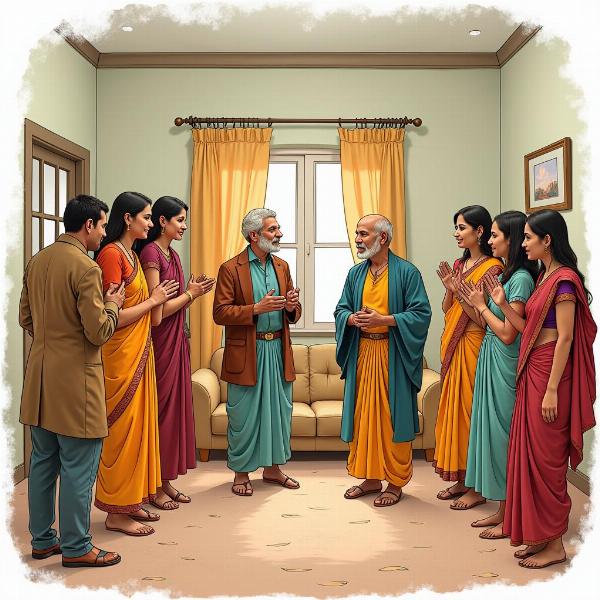Understanding how to say “we will come tomorrow” in Hindi is essential for effective communication when traveling or interacting with Hindi speakers. This phrase is a common courtesy, used in various situations, from confirming appointments to making casual plans. Knowing the correct translation and usage can significantly enhance your interactions and demonstrate respect for the language and culture.
Different Ways to Say “We Will Come Tomorrow” in Hindi
There are several ways to express “we will come tomorrow” in Hindi, each with slight nuances in meaning and formality. Choosing the right phrase depends on the context and your relationship with the person you’re speaking to.
Formal and Respectful Options
- हम कल आएंगे (Ham kal aaenge): This is the most common and versatile translation. It’s generally considered polite and appropriate in most situations. “Ham” means “we,” “kal” means “tomorrow,” and “aaenge” is the future tense of the verb “aana” (to come).
- हम कल अवश्य आएंगे (Ham kal avashya aaenge): Adding “avashya” emphasizes certainty and assurance. This is suitable when you want to convey strong commitment to your arrival.
Informal Options
- कल आएँगे (Kal aaenge): This is a shorter, more informal version of the standard translation. It’s acceptable among friends and family.
- कल मिलते हैं (Kal milte hain): This translates to “See you tomorrow.” It’s a casual way to express your intention to meet someone the next day.
 Formal Hindi Phrases for We Will Come Tomorrow
Formal Hindi Phrases for We Will Come Tomorrow
Using the Right Pronunciation
Correct pronunciation is crucial for clear communication. Pay attention to the following:
- The “a” in “kal” is short, like the “u” in “cut.”
- The “aa” in “aaenge” is long, like the “a” in “father.”
- The “ng” sound in “aaenge” is nasal, similar to the “ng” in “sing.”
Practicing these sounds will help ensure that you’re understood.
Common Scenarios and Usage Examples
Here are some examples of how you might use these phrases in different contexts:
- Making plans with friends: “Kal milte hain! (See you tomorrow!)”
- Confirming a business appointment: “Ham kal avashya aaenge. (We will definitely come tomorrow.)”
- Telling family you’ll visit: “Ham kal aaenge. (We will come tomorrow.)”
Beyond “Tomorrow”: Expressing Future Intentions in Hindi
While “we will come tomorrow” is a useful phrase, knowing how to express future intentions in general can be invaluable. Here are some related expressions:
- We will come later: हम बाद में आएंगे (Ham baad mein aaenge)
- We will come next week: हम अगले हफ़्ते आएंगे (Ham agle hafte aaenge)
- We will come soon: हम जल्द ही आएंगे (Ham jald hi aaenge)
Why Accurate Translation Matters
Using the correct Hindi translation demonstrates respect for the language and culture. It can also help build rapport and avoid misunderstandings. It will be meaning in hindi can provide deeper insights into conveying future tenses accurately.
Expert Insight
Dr. Anamika Sharma, a renowned linguist specializing in Hindi, emphasizes the importance of accurate translation: “Using the appropriate phrase not only conveys your message clearly but also shows that you value the nuances of the language. This can greatly enhance cross-cultural communication.”
Conclusion
Learning how to say “we will come tomorrow” in Hindi is a simple yet significant step towards effective communication. By understanding the various options and nuances, you can express yourself clearly and respectfully, fostering better interactions with Hindi speakers. Remember, accurate translation and proper pronunciation are key to successful communication. Knowing alternative phrases for expressing future intentions further expands your conversational abilities. Aney meaning in hindi can provide further context for understanding the nuances of arrival and coming.
FAQ
- What is the most polite way to say “we will come tomorrow” in Hindi? The most polite way is “हम कल आएंगे (Ham kal aaenge).”
- How do I say “See you tomorrow” in Hindi? You can say “कल मिलते हैं (Kal milte hain).”
- Is pronunciation important when speaking Hindi? Yes, correct pronunciation is crucial for clear communication.
- Are there other ways to express future intentions in Hindi? Yes, there are various phrases to express future plans, such as “हम बाद में आएंगे (Ham baad mein aaenge)” for “We will come later.”
- Why is accurate translation important? Accurate translation demonstrates respect for the language and culture and prevents misunderstandings. You can call meaning in hindi demonstrates another important phrase for effective communication.
- What is the difference between “Ham kal aaenge” and “Ham kal avashya aaenge”? “Avashya” adds emphasis and assurance, making “Ham kal avashya aaenge” a stronger commitment.
- Where can I learn more about Hindi translations? Conflation meaning in hindi and ges karna meaning in hindi offer insights into other aspects of the language.
Meaning-Hindi.in is your trusted partner for professional Hindi translation services. We specialize in various domains, including business, legal, technical, website localization, educational, and specialized translations. Our expertise ensures accuracy, cultural sensitivity, and timely delivery. Contact us today for high-quality Hindi translations that bridge language barriers and connect you with your target audience. Email: [email protected], Phone: +91 11-4502-7584. Meaning-Hindi.in offers comprehensive language solutions to meet your diverse communication needs.